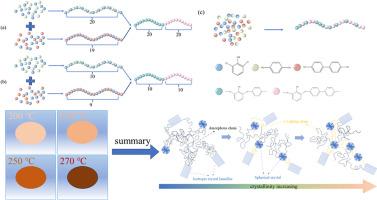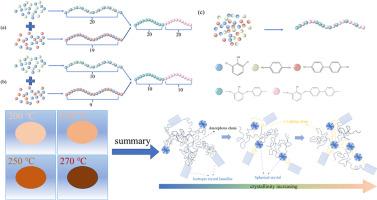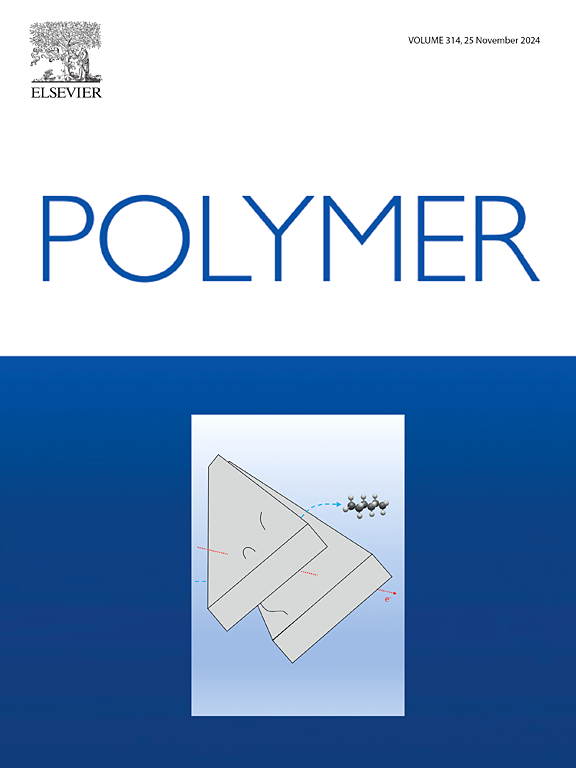Performance modulation of semi-crystalline poly(aryl ether nitrile) block copolymers by regulating molecular chain segment lengths
IF 4.5
2区 化学
Q2 POLYMER SCIENCE
引用次数: 0
Abstract
In the field of precision manufacturing, coefficient of thermal expansion (CTE) serves not only as a critical factor affecting product accuracy but also as a central parameter in thermodynamic system design. In this work, a novel semi-crystalline poly(aryl ether nitrile) block copolymer (PEN(HQ-b-BP)) film was prepared with excellent CTE (about 57 ppm/°C) in large range of 25 °C–275 °C. PEN(HQ-b-BP) performance was modified by regulating molecular chain segment lengths. PEN(HQ-b-BP)-5 % and PEN(HQ-b-BP)-10 % had obvious crystallization peaks in XRD, melting peaks in DSC, and crystal morphology in POM and SEM, which laterally reflect the successful synthesis of PEN(HQ-b-BP). The effects of heat treatment of PEN(HQ-b-BP)-5 % and PEN(HQ-b-BP)-10 % at different temperatures to control the changes of their crystallinity on the properties were deeply investigated. In the case of short molecular chains, the connections between crystalline regions are important. They can substantially increase the tensile strength of the polymer film and significantly reduce the CTE value. For PEN(HQ-b-BP), appropriate temperature treatment can improve the connections between crystalline regions. The tensile strength of PEN(HQ-b-BP)-5 % increased by 70 % from 53 MPa to 90 MPa, and that of PEN(HQ-b-BP)-10 % increased by 78 % from 50 MPa to 89 MPa. Moreover, appropriate temperature treatment facilitates crystal refinement and can effectively reduce the CTE value of the material. The CTE of PEN(HQ-b-BP)-5 % decreased from 51.79 ppm/°C to 46.81 ppm/°C, and that of PEN(HQ-b-BP)-10 % decrease from 49.70 ppm/°C to 47.33 ppm/°C.


通过调节分子链段长度来调节半结晶聚芳醚腈嵌段共聚物的性能
在精密制造领域,热膨胀系数(CTE)不仅是影响产品精度的关键因素,也是热力系统设计的核心参数。在这项工作中,在25°C至275°C的大范围内,以优异的CTE(约57 ppm/°C)制备了一种新型半结晶聚(芳醚腈)嵌段共聚物(PEN(HQ-b-BP))薄膜。通过调节分子链段长度来修饰PEN(HQ-b-BP)的性能。PEN(HQ-b-BP)-5%和PEN(HQ-b-BP)-10%在XRD上有明显的结晶峰,在DSC上有明显的熔融峰,在POM和SEM上有明显的晶体形态,侧面反映了PEN(HQ-b-BP)的成功合成。深入研究了在不同温度下对PEN(HQ-b-BP)-5%和PEN(HQ-b-BP)-10%进行热处理以控制其结晶度变化对性能的影响。在短分子链的情况下,晶体区域之间的连接是重要的。它们可以显著提高聚合物薄膜的抗拉强度,显著降低CTE值。对于PEN(HQ-b-BP),适当的温度处理可以改善晶体区域之间的连接。PEN(HQ-b-BP)-5%的拉伸强度从53 MPa提高到90 MPa,提高了70%;PEN(HQ-b-BP)-10%的拉伸强度从50 MPa提高到89 MPa,提高了78%。此外,适当的温度处理有利于晶体细化,可以有效降低材料的CTE值。PEN(HQ-b-BP)-5%的CTE从51.79 ppm/°C下降到46.81 ppm/°C, PEN(HQ-b-BP)-10%的CTE从49.70 ppm/°C下降到47.33 ppm/°C。
本文章由计算机程序翻译,如有差异,请以英文原文为准。
求助全文
约1分钟内获得全文
求助全文
来源期刊

Polymer
化学-高分子科学
CiteScore
7.90
自引率
8.70%
发文量
959
审稿时长
32 days
期刊介绍:
Polymer is an interdisciplinary journal dedicated to publishing innovative and significant advances in Polymer Physics, Chemistry and Technology. We welcome submissions on polymer hybrids, nanocomposites, characterisation and self-assembly. Polymer also publishes work on the technological application of polymers in energy and optoelectronics.
The main scope is covered but not limited to the following core areas:
Polymer Materials
Nanocomposites and hybrid nanomaterials
Polymer blends, films, fibres, networks and porous materials
Physical Characterization
Characterisation, modelling and simulation* of molecular and materials properties in bulk, solution, and thin films
Polymer Engineering
Advanced multiscale processing methods
Polymer Synthesis, Modification and Self-assembly
Including designer polymer architectures, mechanisms and kinetics, and supramolecular polymerization
Technological Applications
Polymers for energy generation and storage
Polymer membranes for separation technology
Polymers for opto- and microelectronics.
 求助内容:
求助内容: 应助结果提醒方式:
应助结果提醒方式:


